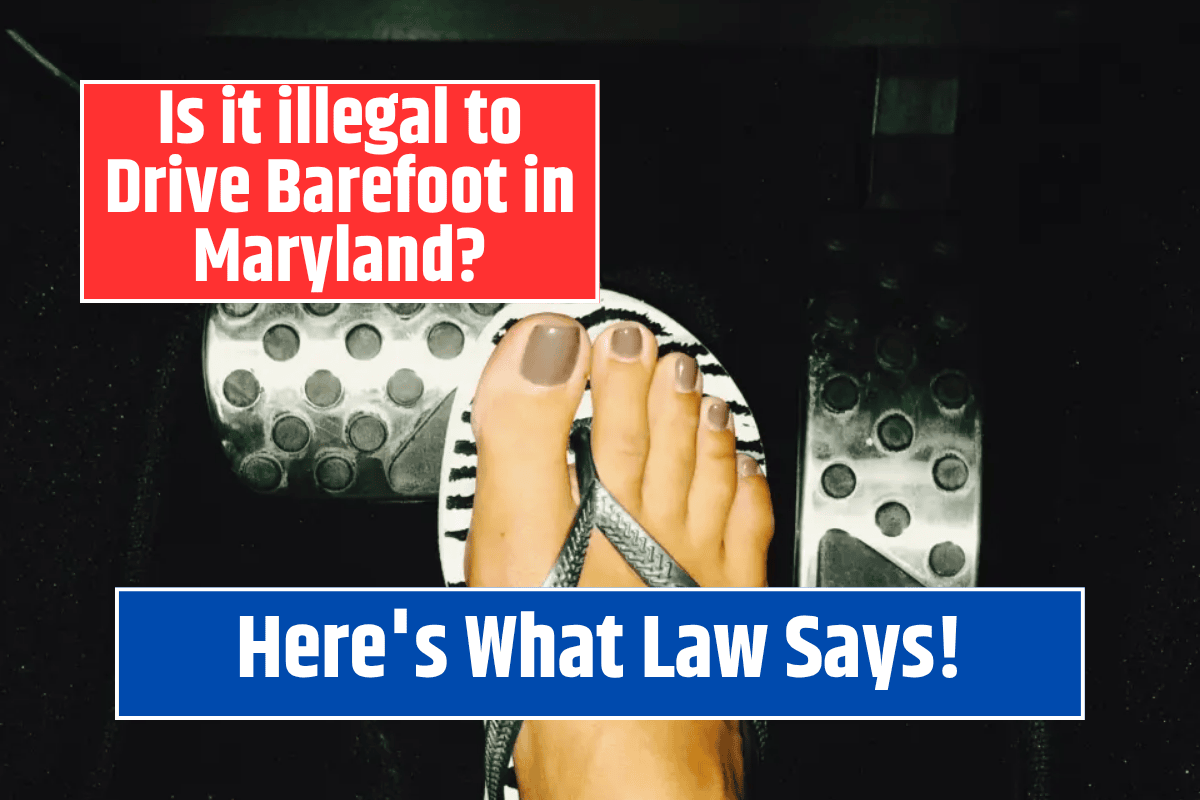Many drivers in Maryland, and across the country, enjoy the freedom of driving barefoot, especially on warm days or short trips. But what if you’re pulled over by the police or involved in an accident while driving without shoes?
Is it illegal, or could it affect your ability to drive safely or get compensation for a car accident? Here’s a breakdown of Maryland’s laws and safety concerns regarding barefoot driving.
Is Driving Barefoot Illegal in Maryland?
In Maryland, driving barefoot is not illegal. There is no law specifically prohibiting the act of driving without shoes, and you are free to drive barefoot without worrying about getting a ticket. In fact, driving barefoot is legal in all 50 states in the U.S. However, while it’s legal, it might not always be the safest choice.
Many people assume that barefoot driving is somehow dangerous, but it’s not the barefoot driving itself that’s the problem—it’s the traction and control of the vehicle that can be compromised when your feet are not securely placed on the pedals.
Safety Concerns: Why You Might Want to Avoid Driving Barefoot
Although it’s legal, there are some safety risks to driving barefoot:
Lack of Traction: Your bare feet may not provide the same traction on the pedals as shoes, especially in wet or slippery conditions. A foot slip could result in losing control of the car, especially when trying to brake or accelerate.
Increased Risk of Accidents: Without the solid grip that shoes offer, you may be at a higher risk of your foot slipping off the brake or gas pedal. In cases where this happens, you might inadvertently accelerate too quickly or fail to stop in time, causing an accident.
Driving With Other Footwear
If you don’t want to drive barefoot, what about other types of footwear? Here’s a look at how common shoes fare when driving:
Flip Flops: Flip flops are a popular option for barefoot drivers, but they come with their own set of risks. They don’t provide much support, and they can easily slip off your feet or get stuck on the pedals, causing distractions and potential accidents.
Boots: Boots provide solid support and traction, but some large boots may get wedged between the gas and brake pedals, which can hinder your ability to operate the vehicle properly.
Slippers: Like flip flops, slippers can easily slip off your feet while driving, potentially causing a distraction and increasing the risk of accidents.
High Heels: High heels are not recommended for driving. Their narrow surface area makes it harder to apply even pressure on the pedals, and the heel can get caught in the floor mats or between the pedals.
What Shoes Are Best for Driving?
When it comes to driving, the best shoes are those that provide solid traction and control without interfering with your ability to move between the pedals. Enclosed shoes with even soles are typically the best choice. Athletic shoes, sneakers, or shoes with flexible soles that allow you to easily move between the gas and brake pedals are ideal.
If you prefer to drive barefoot, or if you need to wear shoes that are less practical for driving, keeping an extra pair of “driving shoes” in your car can be a good solution. This way, you can switch to more appropriate footwear before driving and avoid potential accidents.
Reckless and Negligent Driving Charges in Maryland
While it’s legal to drive barefoot in Maryland, there are laws regarding reckless and negligent driving that you should be aware of. If driving barefoot contributes to the cause of an accident, you could be charged with reckless or negligent driving.
Reckless driving occurs when you operate your vehicle with a willful disregard for the safety of others or property. If driving barefoot results in a dangerous situation or accident, you could be charged with reckless driving.
Negligent driving happens when you operate a motor vehicle in a foolish or careless manner that endangers others. This could apply if barefoot driving causes you to lose control of your vehicle and cause an accident.
If you are found guilty of either charge, you could face a substantial fine, points on your driving record, and possibly civil penalties if your driving caused an accident.
Can I Be Sued for Driving Barefoot in Maryland?
If your decision to drive barefoot directly leads to an accident, you could be held financially responsible. In Maryland, anyone injured in a car accident where you were at fault might file a personal injury lawsuit. The damages they could seek include:
Medical bills
Lost wages
Ongoing care
Physical and emotional distress
Pain and suffering
Loss of enjoyment of life
Even though it’s legal to drive barefoot, if your actions contributed to causing the crash, the injured party could claim that your decision to drive without shoes played a part in their injuries.
Under Maryland’s pure contributory negligence laws, if the other driver is partially at fault, they might not be able to recover compensation for their damages.
While driving barefoot is legal in Maryland, it’s important to weigh the risks against the benefits. Barefoot driving may offer a better feel for the pedals for some, but it also increases the risk of losing control of your vehicle, especially in wet conditions or with distractions.
Always consider your safety and the safety of others on the road. Whether you choose to drive barefoot or wear appropriate footwear, remember that your ability to operate the vehicle safely should always be the priority.












